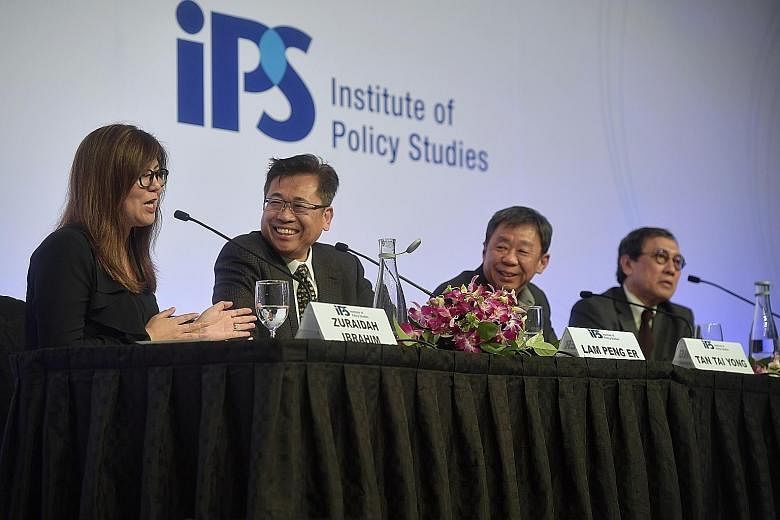The type of opposition that Singaporeans want in local politics was among the issues observers discussed yesterday during a panel session on Singapore's political landscape.
The opposition's disunity is a reflection of the lack of consensus among voters about the kind of political competition they want, said Ms Zuraidah Ibrahim, deputy executive editor of the South China Morning Post.
"Different voters are attracted to different types of opposition. Therefore, there is no single proven formula for both satisfying hard-core opposition voters while at the same time attracting swing voters, first-time voters and loyal PAP (People's Action Party) voters who may be tempted to defect," said Ms Zuraidah, a former deputy editor of The Straits Times.
Academic Lam Peng Er, who was also on the panel at the conference organised by the Institute of Policy Studies, said opposition parties here generally have not critiqued Singapore's fundamental core values, such as meritocracy and multiculturalism, that were established by the nation's founding fathers and continue to be espoused by the PAP.
"If you look at the Workers' Party (WP), it is a bluer shade of white," he quipped.
But if opposition parties can attract talent in greater numbers and offer a narrative which counters the ruling party's "hegemonic ideological discourse", it will be one of the more formidable challenges for the PAP, said Dr Lam, a senior research fellow at the National University of Singapore (NUS).
Ms Zuraidah said it is still unclear whether it would be best for opposition parties to position themselves as radically different from the ruling PAP or as "PAP-lite" and promise change at the margins.
The third panellist, veteran diplomat Bilahari Kausikan, who chairs the Middle East Institute at NUS, warned that Singapore politics will not be exempt from global trends in geopolitics that are currently in a state of flux.
"Identity politics are already upon us, although usually not overtly labelled as identity politics. For example, lurking within debates about foreigners in our economy is really a claim of hierarchy," he said.
"Such claims are far too often not uncontaminated, much as those who make them may deny it, by claims of ethnic privilege."
This is just one example of issues that will surface within the next year as the general election draws nearer, said Mr Bilahari, adding that feelings of insecurity about the future could make Singaporeans vulnerable to both "external and internal snake oil salesmen".
On the state of the opposition here, Ms Zuraidah said the WP - the most successful opposition party - has adopted a cautious approach that "infuriates more impatient opposition supporters".
The Singapore Democratic Party, which traditionally had a bolder and more distinct platform, has "consistently performed worse than the opposition average" under its current leader, Dr Chee Soon Juan, she said, adding: "It is not clear if this is because of its platform, its style of politicking or a question of personality."
She described former PAP MP and central executive committee member Tan Cheng Bock's entry into opposition politics as "groundbreaking" and a "game changer", adding that it could pave the way for other "establishment types" to join the opposition.
But one obstacle for Dr Tan is the fact that many younger voters do not remember him from his time as an MP and recognise him only for his presidential bid in 2011, she said.
The panellists also fielded questions from the audience on various topics, including climate change and the Hong Kong protests.


